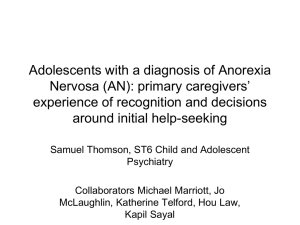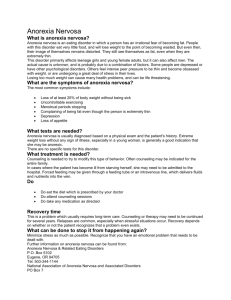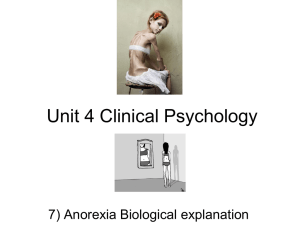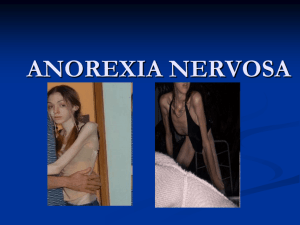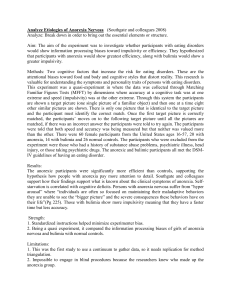Anorexia Nervosa - Strategies for Achieving Health & Wellness 8
advertisement
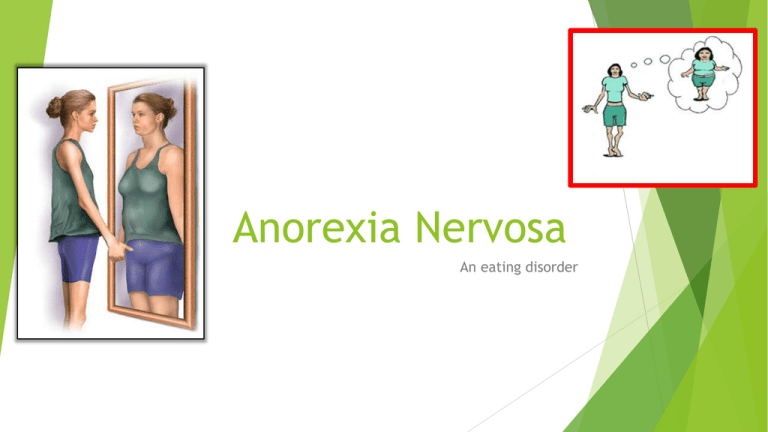
Anorexia Nervosa An eating disorder What is Anorexia Nervosa? Anorexia Nervosa is an eating disorder in which a person has a distorted body image of themselves. This means that no matter how healthy and slim they are, they will see themselves as overweight or obese. Many people who have this disorder refuse to maintain a healthy weight. They also have an intense fear of gaining weigh. This disorder is all about a person’s self-image and how they feel themselves. What they and eat and the amount they eat becomes all they can think about and takes over their life. What causes Anorexia Nervosa in humans? Anorexia Nervosa is caused by internal and external influences Many things can change a person’s mindset and cause them to believe they are overweight, and thus change their eating habits Internal and External factors influence the development of Anorexia Nervosa External Influences Idealized “slim physique” Family encouragement to “lose weight” Peer pressure in school Social Media Idealized Slim Physique/Social Media Many magazines display images of what is considered a “healthy body” or “fit body”, often the person in this image is very slim and has very little body fat People can be influenced by social media on which celebrities post pictures of their “perfect body” Patients may feel the need to be the same way, thus leading them to develop anorexia nervosa Many may believe that having this perfect body image is the only way to be healthy Family Encouragement Family members may encourage on to become more fit and lose a little bit of weight, this could be taken too seriously Some family members may work in a profession where it is important to be fit, this could influence a family member Some family members could repeatedly use condescending terms about the weight of a close family member as a joke, and this could seriously influence a patient (particularly if it is a sibling or cousin) Wanting to be as fit as a close family member Wanting to satisfy people in your family Peer pressure in school Often there is a popular group in school who is a “certain way”, a patient may want to become like these people, thus leading them to have lower self esteem and body image Peers in school may encourage their friends to be a certain way, which could really negatively influence them It’s hard to live up to other people’s expectations, many people feel obligated to be equal beautiful or fit as people in their school This influences the development of Anorexia Nervosa because people often feel pressured to be as fit as their friends thus leading them to want to exercise and eat less Internal Influences Unpleasant experiences (teasing), negative emotions including depression, low self-esteem body dissatisfaction, obsessions about food, inaccurate judgments, rigid thinking patterns Biological influences – Scientists are doubtful about this, some say if it in the family history it may show up, but otherwise it may not be a very influential reason Unpleasant Experiences Getting bullied because of weight or body image – if someone remembers an experience in which their body negatively impacted them, it may lead to them becoming anorexic Having a family member who was overweight and remembering negative experiences of that family member Having a history of overeating and then having negative experiences after that General damage that has been cause due to excessive weight Negative Emotions Having low self-esteem: this can influence development of Anorexia Nervosa because it can lead to people seeing themselves as bigger than they really are, and lead them to take more action in losing weight and becoming more fit Depression: if one is depressed, it leads them to think of all of the negative things in themselves. This then leads them to wanting to improve themselves, which means that they would take measures to lose weight or become more fit. This can lead to going to extremes and thus lead to the development of Anorexia Nervosa Any general negative attitude towards oneself can lead to development of Anorexia Nervosa as it changes how one perceives themselves Body Dissatisfaction Seeing yourself as heavier than what you really are Constantly thinking that you could be healthier Trying to become fit and overdoing it Not wanting to eat in public because you feel you eat too much Lying about amounts of food consumed, constantly saying you ate more Thinking Patterns People may start thinking more and more about their weight and how they can lose weight Constant counting of calories and calculations about weight loss or maintenance Start thinking more and more about the wrongs instead of the rights in one self Unable to concentrate on real work and more important things Life starts to revolve around how many calories are consumed and how much weight is gained or lost from one’s body Summary Anorexia can negatively impact many parts of the body Its important to consult someone (professional) if you see symptoms of anorexia developing in a loved one Anorexia is 9 times more common in males than in females, but still is present in both genders There IS a cure to anorexia, patients do not HAVE to be in that condition forever Patients diagnosed with Anorexia often show symptoms very clearly, which can be noticed especially if one is eating significantly less Help prevent Anorexia Nervosa today!

